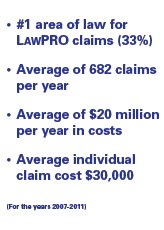Resolutions to avoid litigation claims
- I will enter target dates a few days early to avoid last minute complications. Unforeseen circumstances can arise on the day a document needs to be filed. Setting your target date a few days before a deadline could prevent a snow storm, traffic jam or sick-at-home clerk resulting in a missed deadline.
- I will familiarize myself with the Limitations Act, 2002. We continue to see claims related to lawyers’ unfamiliarity with the new limitations rules. Take the time to review the rules and the related jurisprudence: See, for example, practicePRO’s limitations resources at practicepro.ca/limitations, and LAWPRO’s limitations casebooks, including this comprehensive review: www.practicepro.ca/ LawPROmag/LessonsLearned_LimitationsAct.pdf
- I will avoid administrative dismissals. Rule 48 of the Rules of Civil Procedure allows for the administrative dismissal of non-progressing actions. Be sure to take timely steps to move litigation forward.
- I will talk to my clients more often and not rely on email so much. Lawyers are increasingly using emails to communicate with clients, and this is resulting in misunderstandings. Clients and lawyers read things into emails that aren’t there, miss the meaning of what is said, or read between the lines and make assumptions. During a long litigation matter, arrange some face-to-face meetings, or at least a phone call if distance is an issue.
- I will make sure to have written confirmation of instructions and advice. As in all areas of law, this is a crucial to helping LAWPRO defend you in the event of a claim where you may have no recollection of the details years later. Take notes on your conversations with the client, and document in writing things like the details of settlement offers, the extent of what you will do in limited retainer cases, your advice on accepting (or not) offers, and the likelihood of winning or losing a case and the costs involved.
- I will create more detailed docket notes. Like the resolution above, this has the benefit of helping protect you in the event of a claim (e.g. “Conference with client re risks and costs of litigation” is much better than just “Conference with client re lawsuit.”) It also will help you determine if you are making money on a particular case by giving you a better understanding of the amount of time you and your staff are spending on it.
- I will review my file before closing it to make sure every task is accounted for. It’s a good idea to review your file before closing it and/or putting it into storage to ensure that nothing still needs to be done. If there is and it is part of your retainer, you should ensure that you complete the outstanding work. If it is not, confirm in writing to the client that it is the client’s responsibility to complete the work.
Click here to see the full list of resolutions taken from New Year’s resolutions for a healthier law practice and a new you, which appeared in the December 2012 issue of LAWPRO Magazine.
Categories: Biggest Claims Risks, Civil Litigation



Leave a Reply